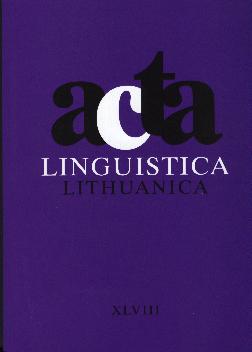Lietuvių kalbos daiktavardiniai junginiai sintaksinių ryšių požiūriu
The Lithuanian noun phrase from the viewpoint of syntactic relationships
Author(s): Ramunė VaskelaitėSubject(s): Language and Literature Studies
Published by: Lietuvių Kalbos Institutas
Keywords: Lithuanian; noun phrase; complementation; modification
Summary/Abstract: The article opens with a discussion of the traditional treatment of syntactic dependency in Lithuanian grammar. In traditional grammar, government (valdymas) and adjunction (šliejimas) are distinguished on the basis of heterogeneous criteria: in some cases only morphosyntactic features are taken into account, in other cases they are distinguished according to whether the dependent is syntactically required by the head or not, though at the same time morphosyntactic criteria are also taken into account. In this article it is pointed out that classifications based on the form of the dependent are morphological rather than syntactic, and that for the purpose of describing syntactic relationships the only relevant criterion is whether the dependent is syntactically required by the head or not. Attempts to combine this criterion with morphosyntactic criteria in earlier Lithuanian grammars have led to numerous [neaiškumų] and contradictions. In this article it is proposed that formal (morphosyntactic) criteria should be disregarded in distinguishing complements from adjuncts. Complements are dependents required by their heads, adjuncts are dependents not required by their heads. These notions are used in decsribing the nominal groups of modern standard Lithuanian. An analysis of Lithuanian nominal groups, carried out from this angle, reveals the existence of several types of heads and dependents. Complements are characteristically required by abstract derivative nouns but not by nouns with a concrete meaning (whether derivative or primitive). Semantically, complements comprise mainly objects, but also certain types of adverbials and possessive modifiers, whereas adjuncts comprise adverbials, attributive words and infinitives of purpose.
Journal: Acta Linguistica Lithuanica
- Issue Year: 2003
- Issue No: 48
- Page Range: 143-158
- Page Count: 15
- Language: Lithuanian

